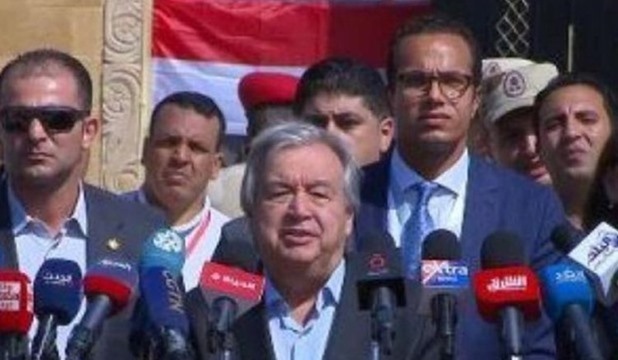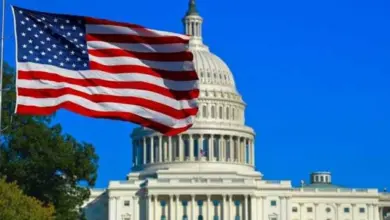
UN humanitarians said on Friday that an agreement to unlock aid deliveries across the border to Gaza was near, as UN chief António Guterres arrived at the Rafah crossing saying aid must move as quickly as possible, UN News reported.
In a passionate speech standing on the Egyptian side of the wall, he pointed behind him and spoke of the two million trapped without sufficient supplies now for nearly two weeks.
“We are witnessing a paradox: behind these walls we have 2 million people that are suffering enormously, have no water, no food, no medicine, no food, that is under fire, that needs everything to survive”.
“On this side,” he continued, indicating the convoy carrying lifesaving supplies, “we have seen so many trucks loaded with water, with food, with medicines – exactly the same thing that is needed on this side of the wall. These are a lifeline. They are the difference between life and death for so many people in Gaza.”
To see the convoy stuck at the border makes what needs to happen very clear, he said.
“What we need is to make them move, to make them move to the other side of this wall to make them move as quickly as possible and as many as possible,” he said, adding that the UN was “now actively engaging with all the parties” related to conditions set for cross-border aid deliveries in the Israel-United States announcement and the related Egypt-Israel agreement.
“We absolutely need to have these trucks moving as quickly as possible and as many as necessary,” he said. “We are not looking for a win. We are looking for convoys to be authorized in meaningful numbers [and for] trucks to go every day into Gaza to provide enough support to the Gazan people.”
It was “absolutely essential to solve these problems quickly”, he said, expressing hope for a swift resolution and reiterating his appeal for a humanitarian ceasefire. He also thanked the Government of Egypt and humanitarian partners for their efforts.
“It is impossible to be here and not to feel a broken heart,” he said, adding that he hoped the food aid and medicines he had seen on planes arriving would serve the people that needed it most and that “one day there will be peace with the two-State solution, with Palestinians and Israelis living in peace.”
Briefing reporters in Geneva on Friday morning, UN humanitarian affairs coordination office (OCHA) spokesperson Jens Laerke said on behalf of UN relief chief Martin Griffiths, “we are in deep and advanced negotiations with all relevant sides to make sure that an aid operation into Gaza starts as quickly as possible and with the right conditions”.
“We are encouraged by reports that the different sides are nearing an agreement on the modalities and that the first delivery is due to start in the next day or so,” he said.
Aid trucks have been waiting at the Rafah border crossing since Saturday. Laerke stressed that while it was necessary to “provide aid to everyone in Gaza regardless of where they are”, Rafah was “the lifeline” which would offer the most direct route to reach people in need.
In response to questions regarding the limited scope of the initial operation, Laerke underscored that it was still under negotiation but that “any trucks that go in would be more than no trucks”.
He also said that in addition to food, water and medicines, fuel was desperately needed in Gaza as the enclave was under an electricity blackout.
“Fuel is a life-saving humanitarian commodity in this crisis,” he insisted




